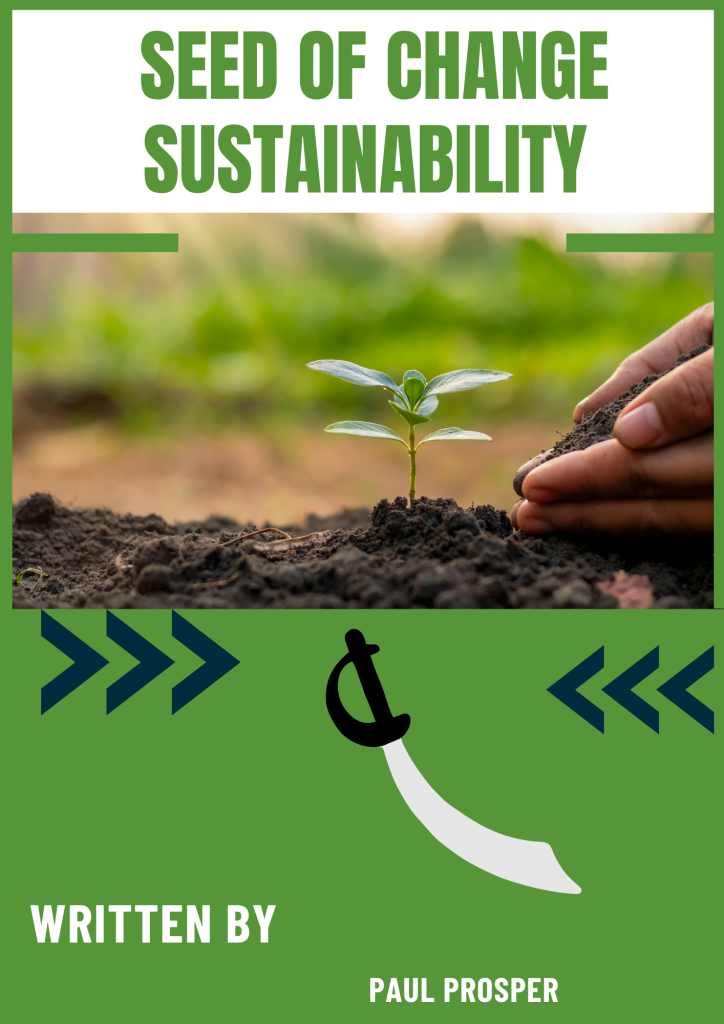The Reality of Hard work
Prosper had always dreamed of becoming a farmer. Growing up in a small village surrounded by lush green fields and dense forests, he had always been fascinated by the way things grew. As a young boy, he would spend hours helping his father on their small farm, learning the ins and outs of agriculture.
But Prosper’s father had bigger aspirations for his son. He wanted Prosper to become a doctor or a lawyer, something that would bring in a steady income and provide a comfortable life. Prosper tried to please his father, but his heart was never in it. He struggled through school, always finding himself drawn back to the land.
Finally, after completing his education, Prosper decided to follow his heart and become a farmer. His father was disappointed, but Prosper was determined. He worked hard, using every trick and technique he had learned from his father to coax life from the soil.
But despite his best efforts, Prosper’s farm struggled to thrive. The soil was poor, and the crops were constantly plagued by pests and diseases. Prosper worked tirelessly, but no matter what he did, he couldn’t seem to catch a break.
Mentorship
Just when he was about to give up, Prosper met Kofi Owusu, a wise old farmer who had spent his life working the land. Kofi took Prosper under his wing, teaching him the secrets of sustainable agriculture and showing him how to work with nature, rather than against it.
Under Kofi’s guidance, Prosper’s farm began to flourish. He learned how to use natural methods to control pests and diseases, and how to improve the soil through the use of compost and manure. Slowly but surely, Prosper’s crops began to thrive, and his farm became a model of sustainability.
As Prosper’s farm continued to thrive, he began to receive attention from other farmers and agricultural experts. They were amazed by his success and wanted to learn more about his methods.
One day, a group of agricultural researchers from a nearby university visited Prosper’s farm. They were led by a renowned entomologist, Dr. Ama Bentsi-Enchill.
Dr. Bentsi-Enchill was fascinated by Prosper’s use of beneficial bugs to control pests. She asked him to explain his methods in detail and to share his knowledge with her team.
Prosper was happy to oblige. He spent hours explaining his techniques and sharing his experiences with Dr. Bentsi-Enchill and her team.
As they prepared to leave, Dr. Bentsi-Enchill turned to Prosper and said, “You know, Prosper, your methods are not only effective, but they are also sustainable and environmentally friendly. We would like to feature your farm as a model of sustainable agriculture in our next research publication.”
Prosper was thrilled. He had never imagined that his farm would be recognized in such a way.
But as he walked Dr. Bentsi-Enchill and her team back to their vehicle, he couldn’t help but feel a sense of pride and accomplishment. He had worked hard to build his farm, and it was gratifying to see his efforts recognized.
As they drove away, Prosper turned to Kofi Owusu, who had been watching from the sidelines, and said, “You know, Kofi, I couldn’t have done it without your guidance and support.”
Kofi Owusu smiled and placed a hand on Prosper’s shoulder. “You are a true farmer, Prosper,” he said. “You have a deep understanding of the natural world and a passion for working with the land. I am proud of you.”
Prosper smiled, feeling a sense of gratitude and respect for Kofi Owusu. He knew that he still had much to learn, but he was excited for the journey ahead.
The story of Prosper’s journey was one of inspiration and hope. It showed that with hard work and determination, anything was possible. And it highlighted the importance of community and collaboration in achieving success.
As Prosper looked out at the audience, he knew that his story would continue to inspire and motivate others. He had achieved his dreams, but he knew that there was still much work to be done. And he was excited to see what the future held.
But Prosper’s journey was not without its challenges. One day, as he was inspecting his crops, he noticed that some of the plants were beginning to wither and die. He couldn’t understand what was causing it, and he knew he had to act fast to save his crops.
Prosper spent hours researching and experimenting, trying to find a solution to the problem. But no matter what he did, the crops continued to wither and die.
Just when he was about to give up, Prosper received a visit from Akua, a young woman who had recently returned to the village. Akua was a skilled farmer, with a passion for sustainable agriculture and a deep understanding of the natural world.
The Hint
Akua took one look at Prosper’s crops and nodded knowingly. “I see the problem,” she said. “Your crops are being attacked by pests.
Akua crouched down, inspecting the underside of the leaves and the soil around the withering crops. Her sharp eyes spotted tiny insects clinging to the plants, sucking the life out of them. “These are aphids,” she explained, her voice calm but confident. “They’re small, but they can do significant damage if left unchecked. However, there’s no need to panic. We can deal with this.”
Prosper leaned in, eager to learn. “How do we get rid of them? I’ve tried sprays, but they only seem to make things worse.”
Akua smiled and shook her head. “That’s because chemical sprays often kill more than just the pests. They harm the beneficial insects too, and without those natural predators, the aphids return stronger. Instead, we’ll use nature’s allies.”
She walked him through the solution, teaching him how to encourage the presence of ladybugs, which feed on aphids. Together, they built small shelters around the farm to attract the beneficial insects. Akua also showed him how to make a homemade neem oil spray that would deter the aphids without harming the plants or the soil.
Within weeks, Prosper began to see the results. The aphid population dwindled, and his crops started to regain their vigor. He was amazed at how effective the natural methods were. “I would never have thought of this,” he admitted. “You have such a deep understanding of farming, Akua. Where did you learn all this?”
Akua explained that she had spent several years working on a permaculture farm in another region. There, she had learned how to design agricultural systems that mimicked natural ecosystems, ensuring long-term sustainability. When she returned to the village, she had hoped to share her knowledge, but many were resistant to change. “Most people here think traditional methods are outdated, and they dismiss sustainable farming as impractical,” she said. “But I’m glad to see someone like you, Prosper, who’s open to learning and trying new things.”
Inspired by Akua’s expertise and enthusiasm, Prosper invited her to partner with him on the farm. Together, they worked tirelessly, experimenting with new techniques and refining old ones. They introduced companion planting, intercropping, and crop rotation to improve soil health and reduce pests naturally. They also established a composting system to enrich the soil, ensuring that the land would remain fertile for years to come.
Their collaboration soon bore fruit—literally and figuratively. Prosper’s farm became more productive than ever, yielding a variety of healthy, vibrant crops. Word spread throughout the village, and other farmers began to take notice. They came to Prosper and Akua for advice, curious to learn about the methods that had transformed the struggling farm into a thriving oasis.
Partnership
One day, Prosper and Akua organized a workshop to teach sustainable farming practices to the community. They demonstrated how to create compost, manage pests without chemicals, and design irrigation systems that conserved water. Farmers who had once been skeptical began to see the value in their approach.
During the workshop, an elderly farmer named Nana Kwame approached Prosper and Akua. He had been farming for decades but confessed that he had never seen such remarkable results. “I’ve always relied on synthetic fertilizers and pesticides,” he said. “But seeing what you’ve achieved makes me wonder if I’ve been doing it wrong all these years.”
Akua placed a reassuring hand on Nana Kwame’s shoulder. “It’s never too late to change,” she said. “The land is forgiving if we treat it with respect. And we’re here to help.”
As the seasons passed, Prosper and Akua became respected leaders in the agricultural community. They not only improved their own farm but also uplifted others, creating a network of farmers committed to sustainable practices. They received invitations to speak at agricultural conferences and were featured in publications that celebrated their innovative work.
Prosper often thought about his journey and how far he had come. He remembered the early days of struggle, the disappointment in his father’s eyes when he chose farming, and the countless nights he had spent worrying about whether he had made the right decision. But now, standing in the midst of his flourishing fields, surrounded by a supportive community, he felt a profound sense of fulfillment.
One evening, as the sun dipped below the horizon and painted the sky in hues of orange and pink, Prosper and Akua sat on the porch of the farmhouse, sipping tea and reflecting on their journey. “Do you ever think about what’s next?” Akua asked.
Prosper nodded thoughtfully. “I do. I want this farm to be more than just a place that grows crops. I want it to be a center for learning, a place where anyone can come and see what’s possible when you work with the land instead of against it.”
Akua’s eyes lit up. “A teaching farm. That’s a wonderful idea! We could host more workshops, bring in experts, and even start a mentorship program for young farmers.”
Excitement bubbled between them as they discussed their vision. They dreamed of building a small training center on the farm, complete with classrooms and demonstration plots. They also envisioned collaborating with universities and agricultural organizations to develop new techniques and share their findings with a wider audience.
Prosper knew it wouldn’t be easy, but he was no stranger to challenges. With Akua by his side and the support of the community, he felt ready to take the next step. His dream of farming had grown beyond his own aspirations—it had become a mission to inspire and empower others.
As they sat under the starlit sky, Prosper felt a deep sense of gratitude. For the land that had taught him resilience. For Kofi Owusu, whose wisdom had guided him in his darkest moments. And for Akua, whose knowledge and partnership had transformed his dream into a reality.
The journey was far from over, but Prosper was excited for what lay ahead. The dream of farming was no longer just his—it was a shared vision, a beacon of hope f
or a better, more sustainable future.
Sustainability
Prosper and Akua spent months planning and implementing their vision for a sustainable development plan on the farm. They began by mapping out key areas for expansion, including a training center, demonstration plots for innovative farming techniques, and a dedicated composting facility. They applied for grants from agricultural development organizations and received support from the university team led by Dr. Ama Bentsi-Enchill. With these resources and the help of the local community, they set their plan into motion.
The first major milestone was building the Prospeseeua Agricultural Learning Center. It was a modest structure with a classroom, a library stocked with books and resources on sustainable farming, and an open-air pavilion for hands-on workshops. Farmers from neighboring villages and even distant regions began visiting the farm to learn about natural pest control, crop rotation, water conservation, and organic soil enrichment.
The farm itself became a living laboratory. Prosper and Akua designated sections of the land for testing various sustainable practices. They planted nitrogen-fixing legumes alongside cash crops to replenish the soil. They installed a drip irrigation system that significantly reduced water waste. They also expanded their use of agroforestry, planting fruit and nut trees among their crops to provide shade, improve soil health, and offer additional sources of income.
One of their most ambitious projects was the introduction of a biogas system. They collected organic waste from the farm and the village to generate clean energy for cooking and electricity. This not only reduced reliance on firewood but also provided nutrient-rich slurry, which they used as fertilizer. The system became a model for resource efficiency, attracting attention from environmental groups and government officials.
As Prosper and Akua’s sustainable development plan took root, the farm flourished like never before. The crops were healthier, the yields more abundant, and the soil richer with life. More importantly, the farm became a beacon of hope and a hub for knowledge sharing. Young people, once disillusioned by the idea of farming, started seeing it as a viable and meaningful career.
The learning center hosted its first major event—a week-long seminar on sustainable farming. Experts, local farmers, and students came together to exchange ideas and experiences. Prosper and Akua led the sessions with confidence, their passion for the land evident in every word they spoke. Dr. Ama Bentsi-Enchill was a keynote speaker, praising their innovative work and emphasizing its impact on the future of agriculture.
During the seminar, Prosper was approached by a group of young farmers who expressed their gratitude. One of them, a bright-eyed man named Kwabena, said, “You’ve shown us that farming isn’t just about survival—it’s about thriving, about building a future. I want to take what I’ve learned here and start something like this in my own village.”
Those words filled Prosper’s heart with pride. He realized that his dream had grown beyond himself and his farm. It was now a movement, a ripple of change spreading across the region.
The turning point came when the government recognized Prosper and Akua’s farm as a model for rural development. They were invited to speak at national forums, where they shared their story and advocated for policies that supported small-scale farmers and sustainable practices. Their farm became a pilot site for new agricultural initiatives, and they began mentoring farmers on a broader scale.
As the years passed, the impact of their work deepened. Prosper and Akua trained hundreds of farmers, directly and indirectly transforming countless lives. The village itself became a hub of agricultural innovation, with more farms adopting sustainable methods. Prosper’s father, once skeptical of his choice, now beamed with pride, often telling visitors, “My son’s farm is feeding people, not just with food but with hope.”
One evening, years after they had first started their partnership, Prosper and Akua stood at the edge of their fields, now a vibrant mosaic of crops, trees, and buzzing life. The sun was setting, casting a golden glow over the land. Prosper turned to Akua, his heart full. “This is more than I ever dreamed of,” he said. “We’ve built something that will outlast us, something that will continue to grow.”
Akua smiled. “And it all started with a dream. But dreams need hard work, faith, and people who believe in them to become reality.”
The two shared a quiet moment, the hum of the farm around them a testament to their journey. They had faced challenges, weathered storms, and risen above doubt, always guided by their love for the land and their desire to make a difference.
Their story became a symbol of resilience, innovation, and the power of following one’s passion. As Prosper and Akua looked out over the fields, they knew their work was not done—there were still farmers to mentor, new challenges to tackle, and a future to build. But they were ready.
For Prosper, the dream of farming had transformed into something greater than he had ever imagined. It was no longer just about him or even his community. It was about creating a legacy—one that proved that farming, when done with care and respect for the land, could change the world. And with Akua by his side, he knew the best was yet to come.
The journey Prosper and Akua embarked on was more than a pursuit of personal fulfillment—it was a mission that redefined what farming could mean for their community and beyond. Through innovation, resilience, and unwavering dedication, they transformed a struggling piece of land into a thriving, sustainable model that inspired countless others. Their work proved that farming wasn’t just about harvesting crops; it was about nurturing the earth, uplifting communities, and ensuring a brighter future for generations to come.
As they stood together one evening, watching a group of young farmers eagerly learning in the fields, Prosper turned to Akua and said, “This is the legacy I dreamed of—not just a farm, but a movement.
Akua nodded, her face lit with quiet pride. “And it’s only the beginning. The seeds we’ve planted will grow in ways we can’t yet imagine.”
Together, they understood that their story wasn’t just about them—it was about the power of dreams, hard work, and collaboration to create meaningful change. Their farm stood as a testament to what was possible when people dared to dream big and work tirelessly for a cause they believed in.
The fields stretched before them, vibrant and alive, mirroring the hope and determination they had poured into their work. Prosper smiled, knowing they had built something that would last far beyond their lifetimes—a true legacy atio.
The journey Prosper and Akua embarked on was more than a pursuit of personal fulfillment—it was a mission that redefined what farming could mean for their community and beyond. Through innovation, resilience, and unwavering dedication, they transformed a struggling piece of land into a thriving, sustainable model that inspired countless others. Their work proved that farming wasn’t just about harvesting crops; it was about nurturing the earth, uplifting communities, and ensuring a brighter future for generations to come.
As they stood together one evening, watching a group of young farmers eagerly learning in the fields, Prosper turned to Akua and said, “This is the legacy I dreamed of—not just a farm, but a movement.”
Akua nodded, her face lit with quiet pride. “And it’s only the beginning. The seeds we’ve planted will grow in ways we can’t yet imagine.”
Together, they understood that their story wasn’t just about them—it was about the power of dreams, hard work, and collaboration to create meaningful change. Their farm stood as a testament to what was possible when people dared to dream big and work tirelessly for a cause they believed in.
The fields stretched before them, vibrant and alive, mirroring the hope and determination they had poured into their work. Prosper smiled, knowing they had built something that would last far beyond their lifetimes—a true legacy of growth, sustainability, and inspiration.
![]()





Educative and Interesting 🤌
Guys, anyone else using sg777livelogin? I’m trying to see if they have any exciting live games going on. What are your favorite live dealer games?
Superkingph… Interesting name! Time to see if it lives up to the hype. Got my fingers crossed for some good entertainment. I’ll give it a try later! Stay tuned, might be big! Have you been seeing this anywhere else?. superkingph